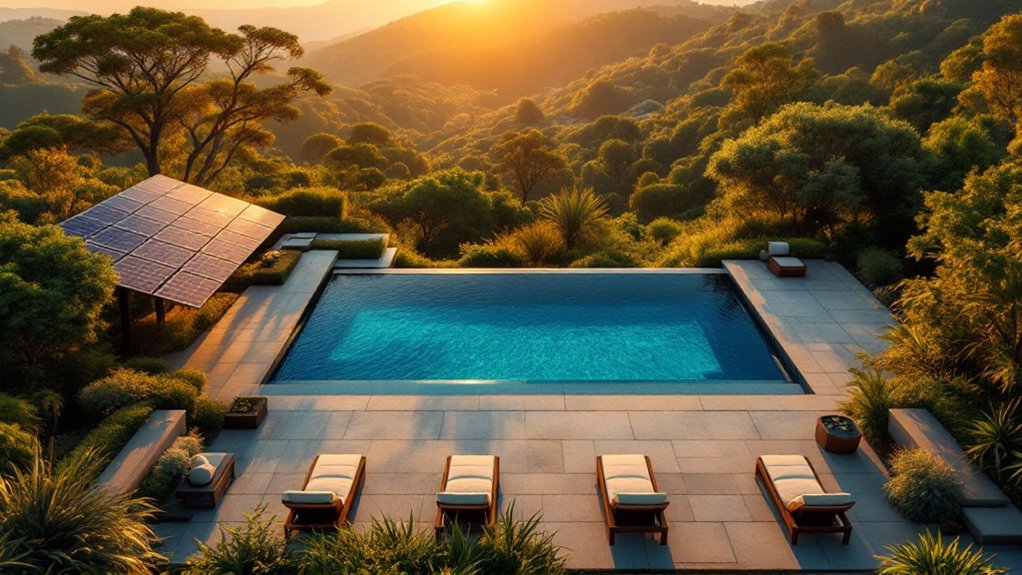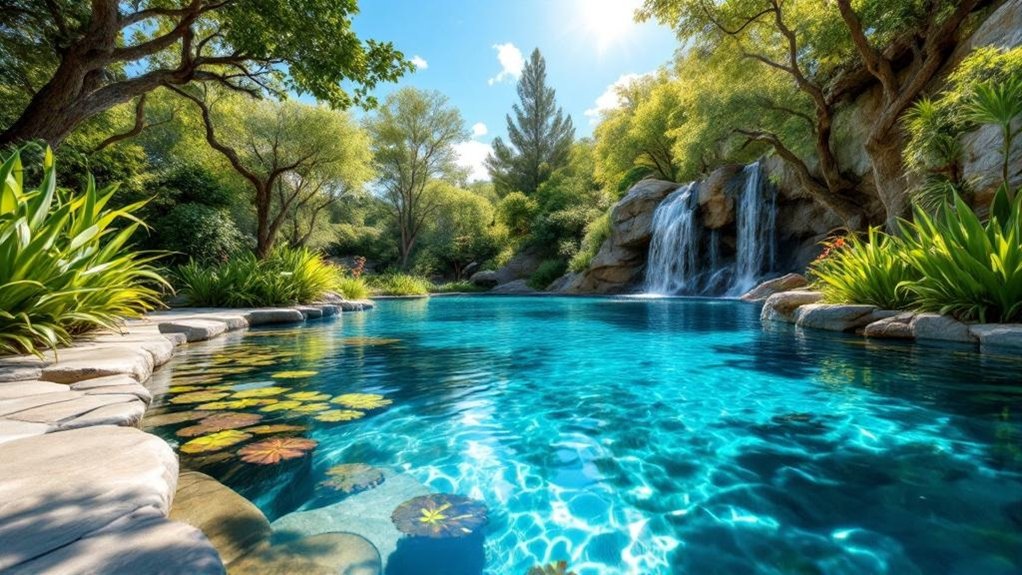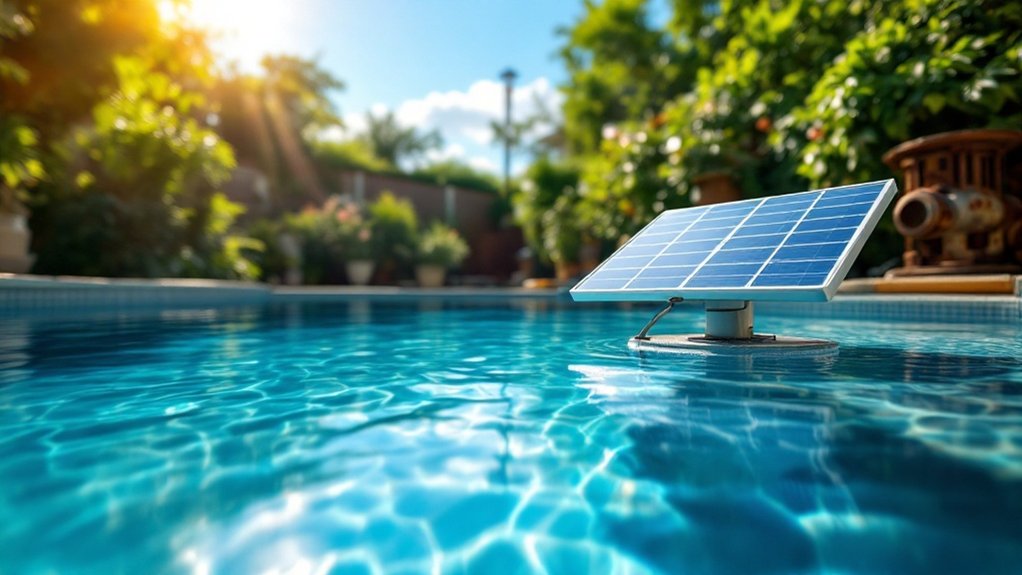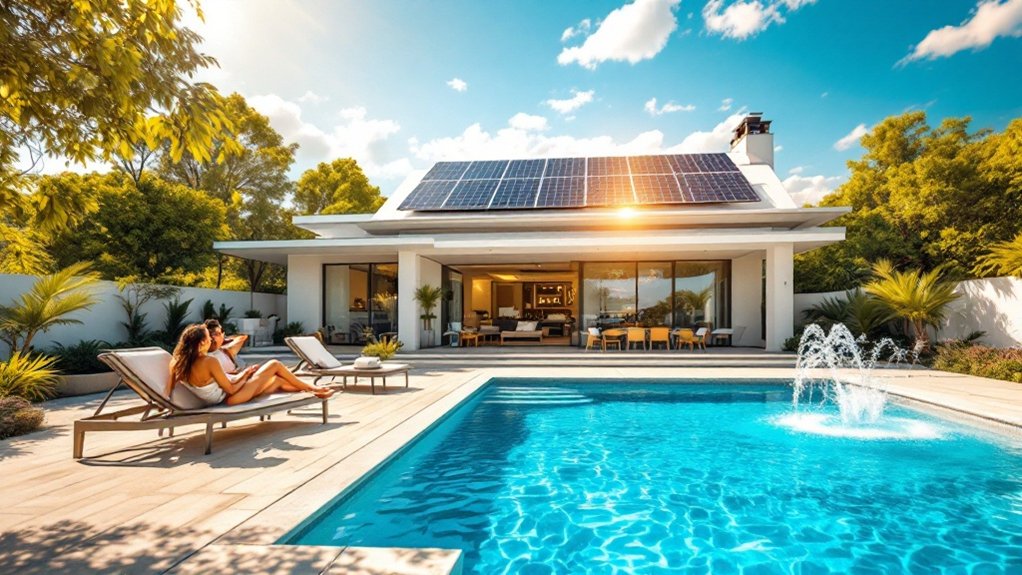Sustainable pool designs are gaining traction as homeowners seek to create eco-friendly outdoor spaces. These pools incorporate materials and technologies that minimize environmental impact while enhancing aesthetic appeal. They offer solutions such as energy-efficient systems and natural water treatment methods. As these innovations continue to evolve, they promise to redefine luxury at home. The question remains: how can these sustainable practices not only beautify a property but also elevate its value?
The Rise of Eco-Friendly Pools
As homeowners increasingly prioritize sustainability, eco-friendly pools are gaining popularity as a viable alternative to traditional designs. These innovative pools utilize environmentally responsible materials and construction techniques to minimize their ecological footprint. Natural swimming pools, which rely on biological filtration systems instead of chemicals, offer a chemical-free alternative that harmonizes with the landscape. Additionally, many eco-friendly pools feature energy-efficient heating systems and are designed to maximize water conservation, reducing overall consumption. The incorporation of renewable resources, such as solar panels for heating, further enhances their sustainability. With an emphasis on reducing energy usage and promoting biodiversity, eco-friendly pools not only provide a revitalizing retreat but also align with the growing trend towards responsible living, appealing to environmentally-conscious homeowners. Furthermore, consulting professionals during the design phase ensures that the pool meets local regulations and is tailored to the specific space and preferences.
Energy-Efficient Filtration Systems
Energy-efficient filtration systems play an important role in sustainable pool designs by utilizing advanced filtration technologies that enhance water quality while minimizing energy use. Solar-powered options further contribute to this efficiency, harnessing renewable energy to reduce overall consumption. As pool owners seek environmentally responsible solutions, these innovations are becoming increasingly vital.
Advanced Filtration Technologies
What makes advanced filtration technologies vital for sustainable pool designs? These systems are designed to optimize water quality while minimizing energy consumption. Utilizing innovative methods, such as multi-stage filtration and ultraviolet (UV) purification, they effectively reduce the need for harsh chemicals, making pools safer for both users and the environment. Advanced filtration technologies also include variable-speed pumps, which adjust flow rates according to demand, thereby lowering energy costs considerably. By improving water clarity and reducing maintenance needs, these systems contribute to a more sustainable pool experience. In addition, their integration with smart technology allows for real-time monitoring and adjustments, ensuring efficient operation. Overall, advanced filtration technologies play an essential role in promoting eco-friendly practices within modern pool designs.
Solar-Powered Options
While traditional pool filtration systems consume significant amounts of electricity, solar-powered options present a sustainable alternative that harnesses renewable energy. These systems utilize solar panels to power filtration pumps, effectively reducing reliance on grid electricity and lowering operational costs. By converting sunlight into energy, homeowners can maintain clean and clear water without the environmental impact associated with conventional systems. Solar-powered filtration systems are designed to be efficient, often equipped with advanced technology that optimizes performance while minimizing energy use. Additionally, many models come with built-in timers and sensors, allowing for automated operation tailored to the pool’s needs. As homeowners increasingly prioritize sustainability, solar-powered filtration options offer an eco-friendly solution that aligns with modern pool design principles.
Reduced Energy Consumption
As homeowners seek to minimize their ecological footprint, opting for filtration systems that considerably reduce energy consumption has become a priority. Energy-efficient filtration systems utilize advanced technology to maintain pool cleanliness while considerably lowering power usage. These systems often feature variable speed pumps, which adjust their operation to match demand, consuming less energy compared to traditional single-speed units. Additionally, many energy-efficient filters incorporate innovative designs that enhance water flow, reducing strain on the system. By investing in these modern filtration solutions, homeowners not only decrease their monthly energy bills but also contribute to a more sustainable environment. As awareness of environmental impact grows, energy-efficient filtration systems are becoming essential components of sustainable pool designs.
Solar Heating Solutions
Solar heating solutions offer an eco-friendly approach to maintaining comfortable water temperatures in pools. These systems harness the sun’s energy, effectively reducing reliance on traditional gas or electric heaters. Solar panels, typically installed on rooftops or nearby structures, capture sunlight and convert it into heat, which is then transferred to the pool water. This method not only lowers energy costs but also minimizes the carbon footprint associated with pool heating. Additionally, modern solar heating systems are designed for efficiency, often featuring advanced controls to optimize performance based on weather conditions. By integrating solar heating solutions, homeowners can enjoy extended swimming seasons while contributing to a more sustainable lifestyle, making this choice increasingly popular in eco-conscious pool design.
Natural Water Treatment Options
Natural water treatment options provide an environmentally friendly alternative to traditional chemical-based methods for pool maintenance. These systems often utilize natural processes, such as biological filtration, to keep water clean and safe for swimming. One popular method involves the use of plants in a natural filtration system, where aquatic plants absorb nutrients and contaminants, promoting a balanced ecosystem. Another option is ozone purification, which effectively eliminates bacteria and viruses without harsh chemicals. Additionally, mineral sanitizers use natural minerals like silver and copper to maintain water clarity and hygiene. By opting for these sustainable solutions, homeowners can enjoy a healthier swimming environment while reducing their ecological footprint and minimizing chemical exposure for their families.
Rainwater Harvesting for Pool Use
While many homeowners seek ways to enhance their pool’s sustainability, rainwater harvesting presents an innovative solution for sourcing water. This method involves collecting and storing rainwater from roofs and other surfaces, which can then be used to fill or maintain pool levels. By integrating a rainwater collection system, homeowners can greatly reduce their reliance on municipal water supplies, leading to lower utility bills and a decreased environmental footprint. The harvested rainwater must be filtered and treated to guarantee cleanliness and safety for pool use. Implementing such systems not only promotes responsible water usage but also aligns with green building practices, transforming traditional pool designs into eco-friendly retreats that harmonize with nature.
Sustainable Pool Materials
Sustainable pool materials play a vital role in minimizing environmental impact while enhancing pool functionality. Eco-friendly construction materials, recycled finishes, and solar heating solutions contribute to a greener pool experience. By selecting these innovative options, pool owners can create a more sustainable outdoor oasis.
Eco-Friendly Construction Materials
Eco-friendly construction materials play an essential role in the design of sustainable pools, offering both aesthetic appeal and environmental benefits. These materials include natural stone, reclaimed wood, and bamboo, which not only enhance the visual charm of pool areas but also minimize ecological impact. Utilizing materials such as permeable pavers helps manage water runoff, promoting better drainage and reducing erosion. Additionally, eco-friendly concrete options, designed with lower carbon footprints, contribute to overall sustainability. By incorporating these innovative materials, homeowners can create beautiful pool environments that align with green building practices. The use of eco-friendly materials reflects a commitment to preserving natural resources while providing a stunning outdoor experience, making them an integral component of modern sustainable pool design.
Recycled Pool Finishes
Recycled pool finishes offer a practical and stylish option for environmentally conscious homeowners looking to enhance their outdoor spaces. These finishes, made from materials such as crushed glass, reclaimed tiles, and recycled stone, not only reduce waste but also provide a unique aesthetic appeal. By choosing recycled materials, homeowners can create a visually stunning pool area that reflects their commitment to sustainability. Additionally, these finishes are often durable and low-maintenance, making them an attractive choice for busy families. The use of recycled pool finishes contributes to a more sustainable lifestyle while allowing for creative expression in pool design. Ultimately, integrating recycled finishes can transform a conventional pool into an eco-friendly oasis.
Solar Heating Solutions
Incorporating innovative technologies can further enhance the sustainability of pool designs. Solar heating solutions stand out as an effective way to maintain comfortable water temperatures while minimizing energy consumption. These systems utilize solar panels, often installed on rooftops or nearby structures, to capture sunlight and convert it into heat. Heated water is then circulated back into the pool, extending swimming seasons and reducing reliance on conventional heating methods.
Moreover, modern solar heaters are designed to be user-friendly and efficient, allowing homeowners to monitor and control temperatures easily. By investing in solar heating solutions, homeowners not only enhance the eco-friendliness of their pools but also contribute to long-term cost savings by lowering utility bills. This sustainable approach aligns with broader environmental goals and promotes responsible energy use.
Designing for Natural Landscaping
While creating a pool that harmonizes with its surroundings, designers often consider natural landscaping as a pivotal element. Integrating the pool within a landscape of native plants, rocks, and water features enhances aesthetic appeal and promotes biodiversity. By selecting flora that thrives in the local climate, designers reduce the need for excessive irrigation and maintenance. Additionally, utilizing natural stone and organic materials for pool surrounds creates a seamless connection between the pool and the environment. Thoughtful placement of trees and shrubs can provide shade and privacy, while also minimizing evaporation. This approach not only elevates the visual experience but also aligns with sustainable practices, ensuring that the pool complements its landscape rather than detracting from it.
Innovative Pool Covers for Energy Savings
Innovative pool covers have emerged as essential tools for enhancing energy efficiency in modern pool designs. Various types of covers, such as solar and thermal options, offer significant benefits by reducing heat loss and minimizing evaporation. By implementing these covers, pool owners can achieve substantial energy savings while maintaining ideal water conditions.
Types of Pool Covers
As homeowners increasingly prioritize sustainability, the selection of pool covers has evolved to include a variety of innovative options designed for energy savings. Among these, solar covers are popular for their ability to harness sunlight, warming the pool water while reducing evaporation. Another option, safety covers, not only protect the pool from debris but also insulate, minimizing heat loss. Mesh covers allow for rainwater drainage while still providing some thermal protection. Automatic pool covers offer convenience and superior insulation, closing with the push of a button. Additionally, thermal blankets provide an effective barrier against heat loss. These diverse types of pool covers cater to different needs, promoting an eco-friendly approach to pool maintenance while enhancing energy efficiency.
Benefits of Energy Savings
When homeowners invest in energy-efficient pool covers, they not only enhance the sustainability of their pools but also experience significant financial savings over time. These innovative covers minimize heat loss, reducing the need for additional heating and consequently lowering energy bills. By retaining warmth and preventing debris accumulation, they simplify maintenance, allowing for lower chemical and cleaning costs. In addition, many energy-efficient pool covers are designed with durable materials that prolong their lifespan, translating into fewer replacements over the years. Additionally, some covers can help maintain ideal water temperatures, allowing for extended swimming seasons without the associated energy costs. Ultimately, these benefits contribute to a more eco-friendly home environment while ensuring that pool owners enjoy substantial economic advantages.
Smart Technology in Sustainable Pools
Smart technology plays a pivotal role in enhancing the sustainability of modern pool designs. Integrated systems enable homeowners to monitor and control energy consumption, water chemistry, and temperature settings remotely. Smart sensors detect water levels and adjust filtration cycles accordingly, optimizing water usage and reducing waste. Automated pool covers, operated through mobile apps, minimize evaporation and heat loss, contributing to energy efficiency. Additionally, advanced lighting systems utilize LED technology, ensuring lower energy consumption while providing aesthetic appeal. These innovations not only streamline maintenance but also promote environmentally friendly practices. By leveraging smart technology, sustainable pools become more efficient, user-friendly, and aligned with contemporary ecological standards, ultimately transforming outdoor spaces into harmonious extensions of the home. Regular pool cleaning services also contribute to maintaining optimal water quality and enhancing the overall sustainability of these designs.
Benefits of Sustainable Pool Designs
While many homeowners seek aesthetic appeal in their outdoor spaces, the benefits of sustainable pool designs extend far beyond visual allure. These pools promote environmental conservation by utilizing energy-efficient systems and eco-friendly materials, reducing water consumption and chemical usage. Additionally, they often incorporate natural filtration systems, enhancing water quality while minimizing harmful runoff. Sustainable pools can also lead to significant cost savings over time, as they lower utility bills and maintenance expenses. Moreover, they contribute positively to property value, appealing to environmentally conscious buyers. By integrating features such as solar heating and rainwater collection, sustainable pool designs create a seamless balance between luxury and responsibility, fostering a healthier ecosystem for future generations. Furthermore, the inclusion of energy-efficient systems can lead to improved heating options, such as gas pool heaters, which provide reliable warmth while maintaining sustainability.
Frequently Asked Questions
How Much Does a Sustainable Pool Typically Cost?
The cost of a sustainable pool generally ranges between $50,000 to $100,000, depending on factors such as size, materials, and eco-friendly features. Homeowners often consider long-term savings and environmental benefits when making their investment.
What Maintenance Is Required for Eco-Friendly Pools?
The maintenance of eco-friendly pools typically includes regular water testing, cleaning filters, monitoring chemical levels, and ensuring efficient energy use. Additionally, landscape maintenance surrounding the pool contributes to the overall sustainability of the environment.
Can I Convert My Existing Pool to a Sustainable Design?
Converting an existing pool to a sustainable design is feasible. Homeowners should consider updating filtration systems, incorporating energy-efficient heating, using eco-friendly materials, and possibly installing natural landscaping to enhance environmental benefits and reduce maintenance.
Are Sustainable Pools Suitable for All Climates?
Sustainable pools can be adapted to various climates, but their effectiveness may vary. Factors such as local weather, water availability, and regional materials influence the suitability and efficiency of sustainable pool designs in different environments.
How Can I Ensure My Pool Is Energy-Efficient Year-Round?
To guarantee year-round energy efficiency, one should consider proper insulation, utilize energy-efficient pumps and heaters, install a solar cover, maintain ideal water levels, and regularly monitor and adjust the pool’s chemical balance and equipment settings.
Conclusion
Sustainable pool designs are revolutionizing the way homeowners approach outdoor spaces, merging luxury with environmental stewardship. By incorporating eco-friendly materials, energy-efficient systems, and innovative technologies, these pools not only enhance aesthetic appeal but also promote sustainability. As more individuals recognize the benefits of sustainable practices, such designs are likely to become the standard, increasing property values while fostering a deeper connection with nature. Ultimately, these pools represent a harmonious blend of comfort, style, and ecological responsibility.




